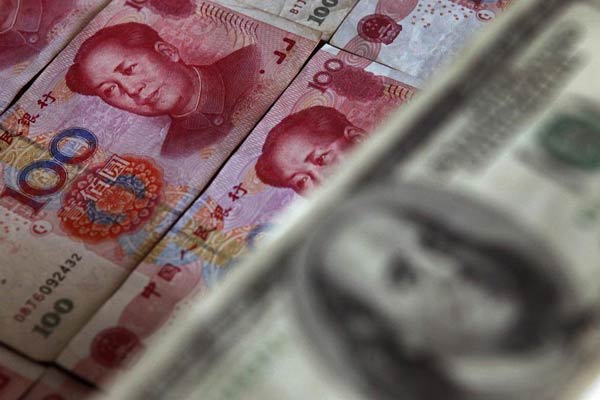Deficit hits $104b in first half
Updated: 2015-07-24 06:59
By CHEN JIA(China Daily)
|
|||||||||||
 |
|
A photo illustration shows a $100 banknote placed above Chinese 100 yuan banknotes in Beijing in May 10, 2013. [Photo/Agencies] |
Cross-border capital flows are becoming more balanced despite high volatility, authority says
The country saw intensified net capital outflow in the first six months as the foreign exchange settlement deficit increased, according to official data released on Thursday.
Chinese banks bought foreign exchange worth 5.31 trillion yuan ($855 billion) in the first half and sold the equivalent of 5.96 trillion yuan, resulting in a net sale of 647.4 billion yuan, the State Administration of Foreign Exchange said. This compares with a 383.8 billion yuan deficit in the second half of last year.
Experts say too much capital outflow in the long term could reduce liquidity in the domestic market, push down the value of the yuan and even slow down real economic growth.
Administration spokeswoman Wang Chunying said flows of capital in and out of the country have become more balanced in recent months, despite a high level of volatility in the first half. "There has been no large and continued capital flight so far," Wang added.
The foreign exchange settlement had a surplus of 12.9 billion yuan in June, compared with a 7.8 billion yuan surplus in May and a 106.2 billion yuan deficit in April, the administration said.
Wang said risks may arise from possible moves by the US Federal Reserve to raise interest rates, but they will be "containable". "Normalization of the Fed's monetary policy will increase pressure on China's capital outflows, but we are confident we can meet the challenges."
The Fed will begin a two-day meeting on Tuesday, and experts said there is a 50 percent chance that it will push up interest rates.
Wang confirmed that the appreciation of the dollar was one of the most important factors behind the flow of capital out of China in the first quarter, but the market's expectations regarding the yuan's exchange rate remained stable in the second quarter.
Uncertainties created by the Greek debt crisis may influence China's cross-border capital flows because of resulting fluctuations in global foreign exchange markets, something that the administration will monitor closely, she added.
Zhu Haibin, the chief economist in China at JP Morgan, said the country is introducing reforms to further free up cross-border capital flows as it seeks to join the International Monetary Fund's foreign exchange reserve basket and push the internationalization of the yuan.
"The opening up of China's capital market as well as the foreign exchange reforms will continue, despite the capital flow volatility," Zhu said.
Bloomberg contributed to this story.
Related Stories
Capital outflow not severe concern in China: JP Morgan 2015-07-23 09:11
Low fertility rate, labor outflow hampers NE China's development 2015-07-17 16:37
China banks see record forex outflow in March 2015-04-24 09:46
Xiamen’s FDI outflow increases in January and February 2015-03-25 12:44
Capital outflow risks 'manageable' 2015-01-23 09:21
Today's Top News
Greek PM under pressure over covert Syriza drachma plan reports
FT sale to Japan's Nikkei includes Chinese website
Beijing condemns Somali attack, mourns deaths
Stocks make sharpest daily decline since 2007
Tian'anmen gets early makeover for grand parade in September
Olympic bid panel cites city's merits
Discovery of Earth-like planet disappoints Chinese Web users
Financial Times sale – the deal no-one saw coming
Hot Topics
Lunar probe , China growth forecasts, Emission rules get tougher, China seen through 'colored lens', International board,
Editor's Picks

|

|
|

|

|

|






